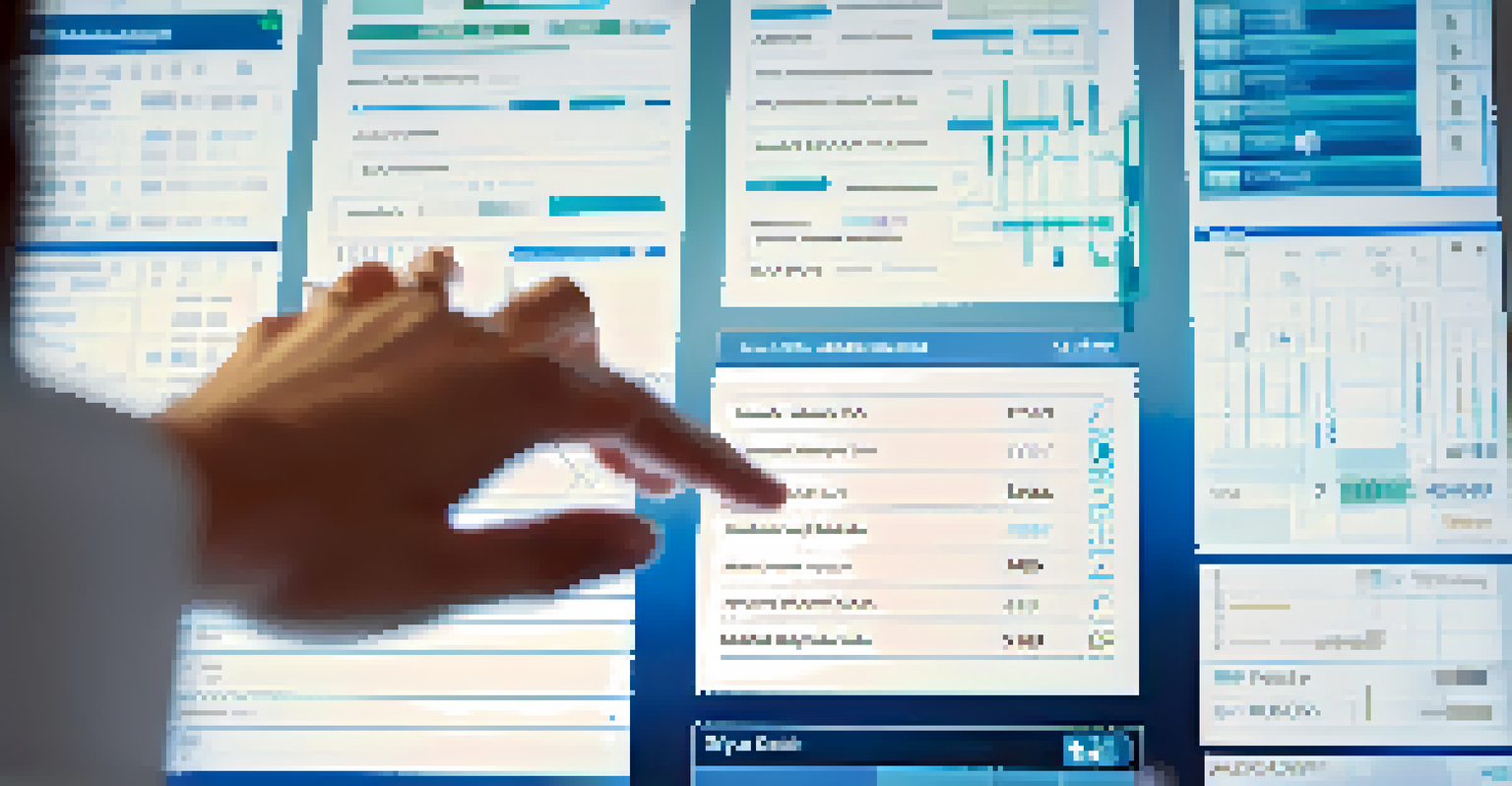The Importance of Interdisciplinary Collaboration in EHRs

Understanding Interdisciplinary Collaboration in Healthcare
Interdisciplinary collaboration involves professionals from different fields working together towards a common goal. In healthcare, this means doctors, nurses, pharmacists, and IT specialists uniting to enhance patient care. By pooling their unique expertise, they can address complex health issues more effectively than any one discipline could alone.
Collaboration allows us to know more than we are capable of knowing by ourselves.
Imagine a team of chefs preparing a gourmet meal; each chef brings a specific skill. Similarly, in healthcare, each professional contributes their knowledge, resulting in a richer, more comprehensive approach to patient care. This collaboration is essential, especially in managing electronic health records (EHRs), which require input from various specialists.
Ultimately, interdisciplinary collaboration fosters an environment where communication flows freely, ideas are shared, and patient outcomes improve. When professionals work together, they not only enhance their understanding but also ensure that all aspects of a patient's health are considered.
The Impact of EHRs on Patient Care and Safety
Electronic health records have revolutionized how patient information is stored and shared. They provide a centralized, easily accessible platform for all healthcare providers involved in a patient's care. This accessibility ensures that everyone from specialists to primary care physicians is on the same page, reducing the risk of errors.

Consider a patient with multiple chronic conditions; their care involves various specialists. EHRs help ensure that each provider has access to the latest information, leading to better-coordinated care and improved patient safety. By having comprehensive records, healthcare teams can make informed decisions, enhancing the overall quality of care.
Collaboration Enhances Patient Care
Interdisciplinary collaboration among healthcare professionals improves patient outcomes by integrating diverse expertise.
Moreover, EHRs facilitate timely interventions by alerting providers to potential issues based on patient history. This proactive approach not only safeguards patient health but also reinforces the importance of interdisciplinary collaboration in utilizing these records effectively.
Facilitating Communication Among Healthcare Professionals
Effective communication is the backbone of any successful healthcare team. EHRs enhance this communication by enabling instant sharing of information between different disciplines. Instead of relying on phone calls or handwritten notes, providers can access up-to-date records in real-time, fostering a more collaborative approach.
The greatest challenge in communication is the illusion that it has been accomplished.
Think of EHRs as a shared playlist where everyone contributes their favorite songs; each healthcare provider adds their insights, creating a comprehensive understanding of the patient’s health. This collective knowledge leads to more informed decisions and a cohesive treatment plan tailored to individual needs.
Additionally, EHRs often include messaging features that allow for quick consultations among team members. This immediacy not only saves time but also strengthens the collaborative efforts essential for effective patient care.
Enhancing Efficiency Through Interdisciplinary Collaboration
Interdisciplinary collaboration in managing EHRs can significantly enhance operational efficiency. By streamlining workflows and minimizing redundancies, healthcare teams can focus more on patient care rather than administrative tasks. When everyone knows their role and how it fits into the larger picture, the entire system runs more smoothly.
Consider a well-orchestrated symphony; each musician plays their part harmoniously, creating beautiful music. Similarly, when healthcare professionals collaborate effectively, they create an efficient system that benefits patients. EHRs play a crucial role in this by automating many processes that would otherwise consume valuable time and resources.
EHRs Improve Communication Efficiency
Electronic health records streamline communication, ensuring all providers have real-time access to vital patient information.
Furthermore, improved efficiency translates to shorter wait times for patients and better allocation of resources. When team members work together seamlessly, they can adapt quickly to changing circumstances, ensuring that patient needs are met promptly.
Promoting Continuous Learning and Improvement
Interdisciplinary collaboration encourages a culture of continuous learning and improvement among healthcare professionals. By working together, team members can share insights, best practices, and lessons learned from their diverse experiences. This ongoing exchange of knowledge helps everyone stay current with the latest advancements in their fields.
For example, a nurse might learn about a new medication's side effects from a pharmacist, while a doctor might share insights on patient management strategies. This cross-pollination of ideas fosters an environment where everyone grows, ultimately benefiting patient care.
Moreover, EHRs often include analytics tools that allow teams to track outcomes and identify areas for improvement. This data-driven approach empowers healthcare professionals to refine their practices continually, ensuring that they provide the best care possible.
Addressing Challenges in Interdisciplinary Collaboration
While interdisciplinary collaboration offers numerous benefits, it also presents challenges that must be addressed. Differences in communication styles, professional cultures, and priorities can create barriers to effective teamwork. Recognizing these challenges is the first step towards overcoming them.
For instance, a busy physician may prioritize clinical tasks over administrative duties, potentially neglecting EHR updates. Conversely, an IT specialist might focus on system functionality, overlooking the clinical implications. By fostering open discussions around these differences, teams can develop strategies to bridge the gaps.
Continuous Learning Drives Improvement
Working together promotes a culture of continuous learning, enabling healthcare teams to share insights and refine practices.
Additionally, training programs that emphasize teamwork and communication can help build a collaborative culture. By investing in these initiatives, healthcare organizations can ensure that their teams are well-equipped to navigate the complexities of interdisciplinary collaboration.
The Future of Interdisciplinary Collaboration in EHRs
As technology evolves, so too does the potential for interdisciplinary collaboration in managing EHRs. Emerging tools, such as artificial intelligence and machine learning, promise to enhance data analysis and predictive modeling, allowing teams to work smarter, not harder. These advancements can help identify trends and inform decisions, ultimately improving patient care.
Imagine a personal assistant that learns your preferences and suggests the best course of action; similarly, AI can analyze vast amounts of patient data to provide insights that support healthcare teams. This capability can lead to even more effective collaborative efforts, as professionals can rely on data-driven recommendations.

Looking ahead, fostering a culture of collaboration will be essential for maximizing the benefits of these technologies. By embracing innovation and maintaining open lines of communication, healthcare teams can continue to enhance patient outcomes and drive improvements in EHR management.